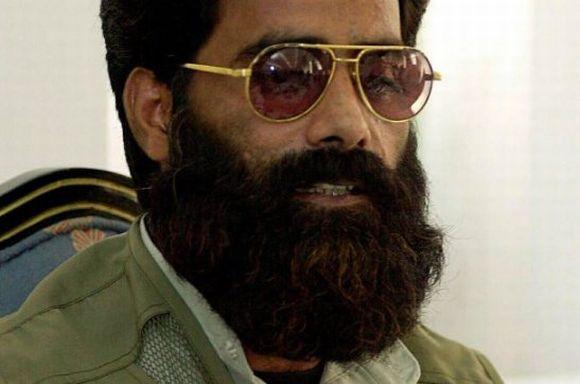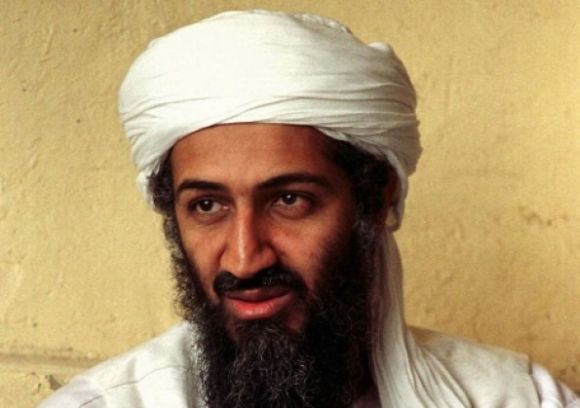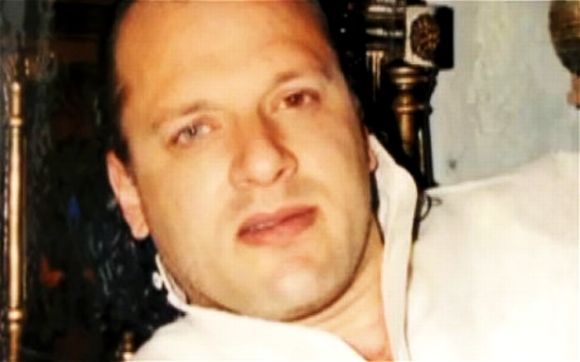 | « Back to article | Print this article |
Is Ilyas Kashmiri really dead? Mystery deepens
The unsolved mystery about the June 3, 2011 killing of Al Qaeda linked Pakistani jehadi leader and the chief of the pro-Kashmir Harkatul Jehadul Islami, Commander Ilyas Kashmiri, in a United States drone attack in South Waziristan Agency, has been deepened further amid Pakistani media reports that he was spotted in North Waziristan recently, reports Amir Mir
Ilyas Kashmiri was the only Pakistani jehadi to have risen in the Al Qaeda ranks to the coveted slot of the terror group's chief military strategist and served as the second-in-command of Commander Saif Al Adal, who was made the interim chief of Qaeda following bin Laden's May 2011 death, only to be replaced with Dr Ayman Al Zawahiri.
Considered to be one of Al Qaeda's most effective commanders, Kashmiri had served as the operational chief of the Harkatul Jehadul Islami, an Al Qaeda-linked group that operates in Pakistan, India, Afghanistan, and Bangladesh.
The HuJI was designated as a terrorist entity by the United States in 2010, and Kashmiri was added to the list of global terrorists for his role in leading HuJI as well as for his links to Al Qaeda.
An exclusive story published by Daily Times reported on March 7, 2011, that true to his reputation, Ilyas Kashmiri, the elusive military strategist of Al Qaeda, had visited North Waziristan in the first week of March and held sittings with the fugitive ameer of Tehrik-e-Taliban Pakistan Commander Hakeemullah Mehsud.
Please click NEXT to read further...
Click here for more Realtime News!
Kashmiri 'resurrects' each time he is declared dead by US drone attack
A former member of Pakistan army's Special Services Group, Kashmiri reportedly spent a night with the TTP ameer as his guest. During his meeting, Daily Times claimed, Ilyas Kashmiri reviewed the future strategy in connection with jehad, his movement and the present situation in Afghanistan.
Previously, two other Pakistani English newspapers, The News and Dawn, had claimed in June 2011 and July 2011 respectively, that Kashmiri had managed to dodge death once again in the US drone attack and that he was still active in the Waziristan region on the Pak-Afghan border belt.
To tell, the truth, Kashmiri is in the habit of returning each time he is declared dead in a drone attack. He had been pronounced dead twice in the past in a short span of one week -- on September 7 and September 14, 2009 -- in American drone attacks after drones targeted his compounds in Turikhel village near Mir Ali town of North Waziristan.
Yet, hardly a month after his reported death he re-surfaced and promised retribution against the US and its proxies, saying the Americans were right to pursue him. "They know their enemy quite well. They know what I am really up to," Ilyas Kashmiri had observed in an interview with Syed Saleem Shahzad, a Pakistani journalist, who was abducted and subsequently tortured to death in May 2011, allegedly by a Pakistani spy agency.
Ilyas Kashmiri's family members, based in the Pakistan-administered part of Kashmir, also believe that he is still alive, although he has not been in touch with them for nearly seven years now.
Kashmiri's elder brother, Chaudhry Asghar, had been quoted by the Pakistani media in the past as saying: I don't believe he is dead. We have no official confirmation of his death so far from any quarter. Even Pakistani intelligence officials have been coming to us, asking if we have received any information. We tell them we have no information. If he has been killed while waging jehad, we would appreciate it because it would be martyrdom".
Although Kashmiri's death was not confirmed by Pakistani authorities, US intelligence officials claimed that he was killed in the June 3, 2011 predator strike which leveled a compound in the Wana area of South Waziristan.
Ustad Ahmad Farooq, Al Qaeda's top spokesman and propagandist in Pakistan and seven other HuJI fighters were reportedly killed in the strike. Immediately after the drone attack, Abu Hanzla Kashir, a purported spokesman for 313 Brigade led by Kashmiri, claimed that Ilyas Kashmiri and Ahmad Farooq were killed in the drone attack.
"On behalf of Harkatul Jehadul Islami's 313 Brigade, we confirm the fact that our leader and commander-in-chief Mohammad Ilyas Kashmiri, along with other companions, has been martyred in an American drone attack at 11:15 pm on June 3, 2011. Insha Allah (God willing) the present pharaoh America will see our full revenge very soon. Our only target is America", said Abu Hanzla in his statement.
But the statement lost its credibility after a photograph of Kashmiri's body, posted on Internet by the HuJI spokesman, turned out to be bogus.
The statement was posted on the Shamukh al-Islam forum, a jehadi website frequented by Al Qaeda sympathisers, along with an image purported to be that of Ilyas Kashmiri's face after his death.
'Terror successor to Osama bin Laden'
But it eventually transpired that the picture posted was that of Abu Ismail Khan, one of the 10-member Lashkar-e-Tayiba fidayeen squad which had carried out the 26/11 Mumbai attacks in 2008, killing 166 people, including over two dozen foreigners.
Abu Ismail Khan was identified as a resident of Dera Ismail Khan District in Khyber Pakhtunkhwa province of Pakistan.
Keeping in view the discrepancies with the pictures and the statement released by the HuJI spokesman, and in the absence of a DNA report, it was hard for the Pakistani investigators to believe that Ilyas Kashmiri had been killed.
They instead believed that the HuJI statement could be a brainy attempt by Kashmiri to deceive those who wanted to hunt him down.
Also, a video clip released on the internet on June 5 showing the pre-burial scene of people killed in the June 3 drone strike in South Waziristan never showed the faces of the dead.
The 50-second video shot in an apple orchard brought to the screen a scene of eight bodies already shrouded in white robes -- the kafan -- as per Islamic rituals. Though eight out of nine dead bodies were placed on the grass, the ninth one was resting on a jute bed, giving the impression that it is the body of someone important, maybe Ilyas Kashmiri.
But it was in October 2011 that fresh questions emerged about Ilyas Kashmiri's death following the release of a propaganda video by Ustad Ahmad Farooq, a Pakistani jehadi commander and Al Qaeda's media chief who had been killed along with Kashmiri in the June 2011 drone strike.
Ustad Farooq urged Muslims in his video to murder anyone who commits blasphemy. He praised the killers of the former Punjab Governor Salman Taseer and Federal Minister for Minorities Affairs Shahbaz Bhatti as "lions of Islam".
The release of the video was significant given the fact that in the past, Al Qaeda had never released propaganda by any of its leaders who are dead, without first announcing their deaths. No statements indicating Farooq's death accompanied the video, meaning thereby that he is still alive and the same could be the case with Kashmiri.
In fact, Ilyas Kashmiri was the first-ever Pakistani jehadi to be tagged by the United Nations and the United States as a "specially designated global terrorist", in August 2010, mainly because of his Al Qaeda connections.
Described as a terror successor to bin Laden by none other than CNN, he was probably the only fugitive jehadi who is not only wanted by India and Pakistan but also by the United States, the United Kingdom, Germany and France.
Kashmiri worked with Headley immediately after 26/11
The extent of the danger Kashmiri posed to the West can be gauged from the nature of the charges brought against him by US Justice Department in January 2009, when a federal grand jury in the Northern District of Illinois indicted him for terrorism-related offenses in connection with a terrorist attack against the Jyllands-Posten newspaper in Denmark that had published odious cartoons of the Prophet Muhammad.
Going by the chargesheet, one of the Kashmiri's jehadi operatives, David Coleman Headley, a Pakistani-American (originally named Dawood Gillani and now serving a life sentence in the US for terror-related offenses) cased the main targets for the 2008 Mumbai attacks.
The US Justice Department concluded in its chargesheet that Kashmiri was working with Headley in late 2008, immediately after the Mumbai attacks, to plot new terrorist attacks by infiltrating highly trained terrorists into America and Europe.
Headley revealed that he had been taken to Pakistan's tribal belt on the Afghan border in 2009 to meet Kashmiri.
Besides David Headley, another Pakistani-American pleaded guilty as recently as on February 11, 2012, to charges of funneling money to Ilyas Kashmiri for terrorist activities in the Indian-administered part of Jammu & Kashmir.
Raja Lahrasib Khan, who was born and raised in Pakistan-occupied Kashmir before he migrated to the US in the 1970s, pleaded guilty to one count relating to material support to a foreign terrorist organisation.
Khan, arrested in March 2010, faces maximum 15 years in prison. Khan admitted that he met Kashmiri in Pakistan in the early to mid-2000s and again in 2008.
Approached for comments, a senior ISI official in Islamabad (requesting anonymity) did not rule out the possibility of Kashmiri having once again cheated the June 2011 drone attack.
"You never know that Shah Sahib, who is the newly appointed ameer of Al Qaeda-linked 313 Brigade, eventually turns out to be none other than Commander Ilyas Kashmir", he added.



